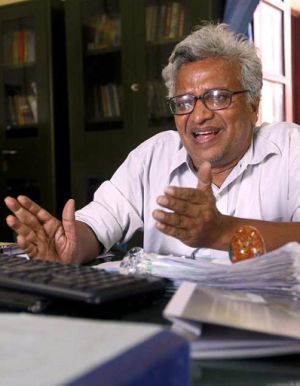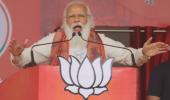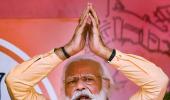'When an individual becomes authoritarian, you can overthrow the individual easily.'
'When the system becomes authoritarian, whoever challenges the system will be called a criminal or an anti-national.'

On Thursday, April 28, with voters casting their vote in the eighth and final phase of the assembly election in West Bengal, this election season will end.
For weeks now, politicians have criss-crossed Assam, Kerala, Puducherry, Tamil Nadu and West Bengal -- the provinces going to the polls -- ignoring the growing surge in COVID-19 cases.
Were the campaigns any different this time?
How aggressive were they?
What kind of impact will it have on the psyche of the voters irrespective of the results on May 2?
"You can't say Mr A or Mr B is corrupt in the BJP; the whole party is corrupt because it is another corporate organisation," Dr R Manivannan, professor and head of the department of politics and public administration at the University of Madras, tells Shobha Warrier/Rediff.com in a two-part discussion on Elections 2021.
How do you look at the entire campaign? Was it any different from what you have seen before?
The first change that I saw was the remarkable integration of traditional mode of door to door campaigning with the use of information technology and social media. A great balance has been acquired in this election between technology and personal reach.
At the ideological level, if you look at the campaigns at the national level, you will see an ideological conflict or confrontation.
That is because the Bharatiya Janata Party wants to edge out the local parties whether it is the Left in Kerala or the Trinamool Congress in West Bengal or the Dravida Munnetra Kazhagam in Tamil Nadu or the Congress and the DMK in Pondicherry.
We have to look at this from a national paradigm and not just as the assembly elections.
Next is the stance taken by these parties. They stoutly defended itself on indigenous issues, local problems and regional identity. For example, what Kerala or Tamil Nadu or West Bengal means to the people.
In Tamil Nadu, the Dravidian identity was put at the forefront which we have not seen in elections in a decade. This, I feel, is quite remarkable.
Pondicherry is the only state where the political discourse was different, not because it is small.
The Emergency of 1975 resulted in a conglomeration of many regional parties
but they became quite insignificant later. Do you see a resurgence of regional parties happening on one side along with the rise of the BJP on the other?
It might happen as it is a historical necessity. How it is going to happen is very important.
For example, we had leaders like (the late DNK supremo Muthuvel) Karunanidhi who was active in national politics, at the same time deeply rooted in state politics.
Look at West Bengal. It is under tremendous onslaught by the BJP. What I mean by onslaught is, the state has to go through 8 phase polling which adds many other dimensions to the polling process.
Even if the law and order situation is bad, it is not a parliamentary election; it is the assembly election.
A state as big as Tamil Nadu where the polling was over in one phase...
Exactly. It is very unfair that West Bengal has to go through this. I do't think West Bengal faces more sensitive law and order issues than Assam. I see a political drive in the 8-phase polling.
The only problem I see in Mamata (Trinamool Congress leader Mamata Banerjee) is that she doesn't have the temperament to build a coalition as she is a loner. She doesn't go in a pack, and she hasn't shown that kind of inclination too. She will have to if she survives this election.
Where do you see the unity of regional parties happening? When I interviewed P C Chacko after he left the Congress, he said his aim was to bring together all the people who had left the Congress as India needed a strong Opposition.
I agree with that. But there are two hindrances to the idea. The first deterrent is the Congress itself as it never allows a coalition that is stronger than itself.
Though the Left is not a deterrent, Mamata will not be able to go with the Left.
During Mrs Indira Gandhi's time, the heartland politicians came together to give a strong opposition to the Congress.
But I feel hereafter, the coalition is not going to be based on parties; it will be based on certain state interests.
So, it is possible to have a coalition of West Bengal, Tamil Nadu, Maharashtra, Kerala, Punjab, Rajasthan, etc. That is like one third of the states standing up to the Centre.
So, the parties will have to reconsider their problems mutually recognising each other in to overcome the hurdles.
That is going to be the turnaround for the next step. We have the example of Mrs Gandhi's times in 1976-77. Many parties that did not see eye to eye -- they were ideologically so far apart -- but they joined hands for a single goal. They came together and worked against a leader.
Was that not transient? The parties that got together against the Emergency, fell apart soon...
Yes, you are right. That is the shortcoming of such a union.
If you look at the present situation, the Congress is on one side and the BJP is on the other side. Here, you are going to fight against centralisation, uniformity, rise in fascism, authoritarianism, and corruption
There is a different kind of corruption now; the corporate corruption and not individual corruption. You can't say Mr A or Mr B is corrupt in the BJP; the whole party is corrupt because it is another corporate organisation.
In fact, the entire system is hijacked by corporate capital.

The system has come under the attack of corporate capitalism like never before. At the same time, the same corporate capital is backing political parties like the BJP.
This is a different kind of challenge, and the proposition of the challenge is much higher.
So, it would demand a similar response from everybody, like the states grouped together and defied the Centre's dictum on the Citizenship (Amendment) Act or the Farm Bill or NEET or the National Education Policy.
The ultimate challenge is to stand against the central government.
What is the difference between Indira Gandhi's Congress and Modi's BJP?
There is one difference. Along with the height of centralisation of power, there was the authoritarianism by an individual. It was the dictatorship by an individual.
What you see now is authoritarianism by a political party. It is not the individual who is authoritarian, but the entire party and the system itself.
Is the system becoming authoritarian more dangerous than an individual becoming authoritarian?
Definitely. When an individual becomes authoritarian, you can overthrow the individual easily. When the system becomes authoritarian, whoever challenges the system will be called a criminal or an anti-national.
India is at the threshold of the 1939-40 Germany! We are at the door for quite some time.
It is not that the BJP's Opposition could not win, or it has not been challenged enormously.
There is people's resistance too. The widespread impression among the people is that the BJP is authoritarian and corporate capital is playing havoc in the system. It has exposed itself that the government is not the defender of the poor people.
Will it be difficult to overthrow a system that is authoritarian?
It is very challenging to overthrow a system that is authoritarian, more challenging than overthrowing an authoritarian individual.
For example, an Allahabad high court could say that the election of Mrs Gandhi was invalid.
Today Parliament has lost the voice, and the power to oppose the government effectively.











 © 2025
© 2025